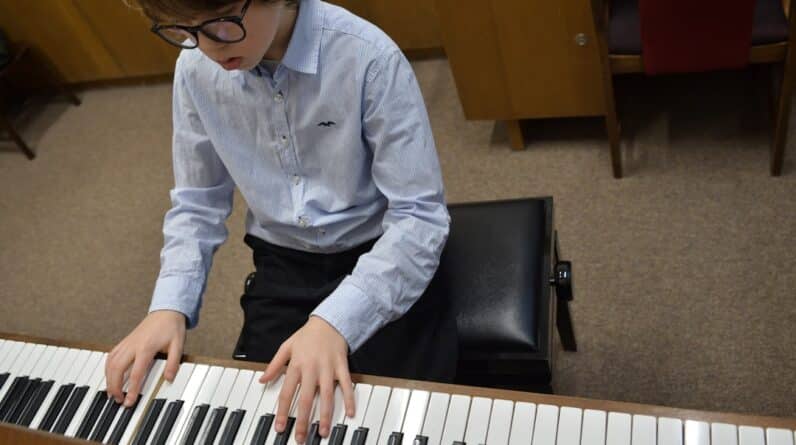
Vocal improvisation is a dynamic and expressive art form that thrives in collaborative music settings. When you engage in vocal improvisation, you are not merely singing; you are participating in a spontaneous dialogue with your fellow musicians. This form of expression allows for a unique blend of creativity and interaction, where each voice contributes to a larger tapestry of sound.
In collaborative environments, the ability to improvise vocally can elevate the overall musical experience, fostering a sense of unity and shared creativity among performers. As you explore vocal improvisation, you may find that it encourages you to step outside your comfort zone. The unpredictability of improvisation can be both exhilarating and daunting, pushing you to trust your instincts and respond to the musical cues of others.
In collaborative settings, this becomes even more significant, as the interplay between musicians can lead to unexpected and beautiful moments. Whether you are in a jazz ensemble, a choir, or an informal jam session, the ability to improvise vocally can transform the way you connect with your peers and the music itself.
Key Takeaways
- Vocal improvisation is a key skill in collaborative music settings, allowing musicians to create spontaneous and unique performances.
- Specialized training in vocal improvisation is important for developing the necessary skills and techniques for successful improvisation.
- There are existing programs and courses available for vocal improvisation training, offering a structured approach to learning and practicing improvisation.
- Specialized training in vocal improvisation can lead to benefits such as increased creativity, musical expression, and confidence in collaborative music settings.
- When choosing a program for vocal improvisation training, it’s important to consider factors such as the curriculum, faculty, and opportunities for performance and collaboration.
The Importance of Specialized Training for Vocal Improvisation
While the essence of vocal improvisation may seem intuitive, specialized training can significantly enhance your skills and confidence. Engaging in structured learning allows you to develop a deeper understanding of musical theory, vocal techniques, and improvisational strategies. This training equips you with the tools necessary to navigate complex musical landscapes and respond effectively to your collaborators.
Without this foundation, you may find yourself relying solely on instinct, which can limit your creative potential. Moreover, specialized training provides you with opportunities to learn from experienced instructors who can offer valuable insights and feedback. These mentors can guide you through various improvisational styles and techniques, helping you discover your unique voice within the collaborative framework.
By investing time in specialized training, you not only refine your vocal abilities but also cultivate a greater appreciation for the nuances of musical interaction. This comprehensive approach ultimately empowers you to contribute more meaningfully to any collaborative music setting.
Existing Programs for Vocal Improvisation Training

As the demand for skilled vocal improvisers grows, numerous programs have emerged to cater to aspiring musicians like yourself. These programs vary widely in focus, duration, and teaching methods, providing a range of options to suit different learning styles and goals. Some institutions offer intensive workshops that concentrate on specific genres, such as jazz or world music, while others provide longer-term courses that encompass a broader spectrum of improvisational techniques.
In addition to traditional music schools and conservatories, online platforms have also become increasingly popular for vocal improvisation training. These virtual programs often feature interactive lessons, video tutorials, and opportunities for peer collaboration. This flexibility allows you to learn at your own pace while still benefiting from expert guidance.
Whether you prefer in-person instruction or online learning, there are ample resources available to help you hone your vocal improvisation skills.
Benefits of Specialized Training in Collaborative Music Settings
The advantages of specialized training in vocal improvisation extend far beyond technical proficiency. One of the most significant benefits is the development of a strong sense of musicality and intuition. As you immerse yourself in structured training, you begin to internalize various musical concepts, enabling you to respond more fluidly to your collaborators.
This heightened awareness fosters a deeper connection with the music and those around you, enhancing the overall collaborative experience. Additionally, specialized training often emphasizes the importance of listening and communication within a group setting. You learn not only how to express yourself vocally but also how to engage with others’ ideas and contributions.
This reciprocal relationship is vital in collaborative music settings, where the success of a performance hinges on the ability of each musician to support and inspire one another. By cultivating these skills through specialized training, you position yourself as a valuable member of any musical ensemble.
How to Choose the Right Program for Vocal Improvisation Training
Selecting the right program for vocal improvisation training can be a daunting task, given the multitude of options available. To make an informed decision, consider your personal goals and aspirations as a musician. Are you looking to refine specific techniques or explore new genres?
Understanding your objectives will help narrow down your choices and ensure that the program aligns with your interests. Another crucial factor to consider is the teaching style and philosophy of the program. Some instructors may prioritize technical skills, while others may focus on fostering creativity and self-expression.
Researching faculty backgrounds and reading reviews from past students can provide valuable insights into what you can expect from each program. Additionally, consider whether the program offers opportunities for collaboration with other musicians, as this aspect is essential for developing your vocal improvisation skills in a supportive environment.
Tips for Improving Vocal Improvisation Skills in Collaborative Music Settings

Improving your vocal improvisation skills requires dedication and practice, especially in collaborative settings where spontaneity reigns supreme. One effective strategy is to actively listen to your fellow musicians during rehearsals or performances. By tuning into their melodies, rhythms, and dynamics, you can respond more thoughtfully and create harmonies that complement their contributions.
This attentiveness not only enhances your improvisational abilities but also strengthens the overall cohesion of the group. Another valuable tip is to experiment with different vocal techniques and styles during practice sessions. Allow yourself the freedom to explore various genres, from jazz scat singing to folk-inspired melodies.
This experimentation will expand your vocal repertoire and encourage you to take risks in your improvisation. Additionally, consider recording your practice sessions to review your progress over time. Listening back can provide insights into areas for improvement and help you identify patterns in your improvisational choices.
Success Stories of Musicians Who Have Benefited from Specialized Training
Many accomplished musicians attribute their success in vocal improvisation to specialized training programs that shaped their artistic journeys. For instance, renowned jazz vocalist Esperanza Spalding has spoken about how her formal education allowed her to explore her unique voice while learning from established artists in the field. Through rigorous training and collaboration with peers, she developed her signature style that blends various genres seamlessly.
Similarly, singer-songwriter Jacob Collier has gained recognition for his innovative approach to vocal improvisation. His experiences in specialized programs provided him with a solid foundation in music theory and performance techniques. By honing his skills through structured training, Collier has become known for his ability to create intricate harmonies and spontaneous arrangements that captivate audiences worldwide.
The Future of Vocal Improvisation Training in Collaborative Music Settings
As the landscape of music continues to evolve, so too does the approach to vocal improvisation training in collaborative settings. With advancements in technology and an increasing emphasis on interdisciplinary collaboration, aspiring musicians like yourself have unprecedented access to resources and opportunities for growth. The future holds promise for innovative training programs that blend traditional techniques with modern practices, allowing for even greater exploration of vocal improvisation.
In this ever-changing environment, it is essential to remain open-minded and adaptable as you navigate your musical journey. Embrace the challenges that come with vocal improvisation and seek out specialized training that resonates with your artistic vision. By doing so, you will not only enhance your own skills but also contribute meaningfully to the vibrant tapestry of collaborative music-making that continues to inspire musicians around the world.
FAQs
What is vocal improvisation in collaborative music settings?
Vocal improvisation in collaborative music settings refers to the spontaneous creation of vocal melodies, rhythms, and lyrics within a group musical context. It often involves interacting with other musicians and responding to the music being played in real time.
Are there programs that offer specialized training for vocal improvisation in collaborative music settings?
Yes, there are programs and workshops specifically designed to provide training in vocal improvisation within collaborative music settings. These programs often focus on developing skills such as ear training, rhythmic awareness, harmonic understanding, and creative expression.
What are the benefits of specialized training in vocal improvisation for collaborative music settings?
Specialized training in vocal improvisation can help musicians develop their creativity, musicality, and ability to communicate and collaborate with other musicians. It can also enhance their performance skills and confidence in improvisational situations.
What are some techniques commonly taught in specialized vocal improvisation programs?
Techniques commonly taught in specialized vocal improvisation programs may include vocal warm-ups, melodic and rhythmic exercises, call-and-response patterns, vocal percussion, and the use of scales and modes for improvisation.
Who can benefit from specialized training in vocal improvisation for collaborative music settings?
Musicians of all levels and backgrounds, including singers, vocalists, instrumentalists, and music educators, can benefit from specialized training in vocal improvisation for collaborative music settings. It is particularly valuable for those who wish to expand their musical vocabulary and enhance their ability to interact and create music in a group setting.





